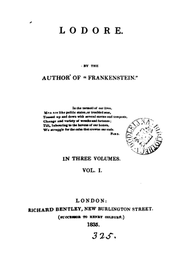
Lodore
Encyclopedia

Romanticism
Romanticism was an artistic, literary and intellectual movement that originated in the second half of the 18th century in Europe, and gained strength in reaction to the Industrial Revolution...
novelist Mary Shelley
Mary Shelley
Mary Shelley was a British novelist, short story writer, dramatist, essayist, biographer, and travel writer, best known for her Gothic novel Frankenstein: or, The Modern Prometheus . She also edited and promoted the works of her husband, the Romantic poet and philosopher Percy Bysshe Shelley...
, completed in 1833 and published in 1835.
Plot and themes
In Lodore, Shelley focused her theme of power and responsibility on the microcosm of the family. The central story follows the fortunes of the wife and daughter of the title character, Lord Lodore, who is killed in a duel at the end of the first volume, leaving a trail of legal, financial, and familial obstacles for the two "heroines" to negotiate. Mary Shelley places female characters at the centre of the ensuing narratives: Lodore's daughter, Ethel, raised to be over-dependent on paternal control; his estranged wife, Cornelia, preoccupied with the norms and appearances of aristocraticAristocracy
Aristocracy , is a form of government in which a few elite citizens rule. The term derives from the Greek aristokratia, meaning "rule of the best". In origin in Ancient Greece, it was conceived of as rule by the best qualified citizens, and contrasted with monarchy...
society; and the intellectual and independent Fanny Derham, with whom both are contrasted.
The novel's modern editor, Lisa Vargo, has noted the text's engagement with political and ideological issues, particularly the education and social role of women. She suggests that Lodore dissects a patriarchal culture that separated the sexes and pressured women into dependence on men. In the view of critic Betty T. Bennett, "the novel proposes egalitarian educational paradigms for women and men, which would bring social justice as well as the spiritual and intellectual means by which to meet the challenges life invariably brings". The novel ends, significantly, with Fanny Derham, the model of the independent woman.
Reception
Lodore was a success with the reviewers: Fraser's MagazineFraser's Magazine
Fraser's Magazine for Town and Country was a general and literary journal published in London from 1830 to 1882, which initially took a strong Tory line in politics. It was founded by Hugh Fraser and William Maginn in 1830 and loosely directed by Maginn under the name Oliver Yorke until about 1840...
praised its "depth and sweep of thought", for example; and it prompted The Literary Gazette to call Mary Shelley "one of the most original of our modern writers". Later nineteenth-century critics were more dubious: in 1886, Edward Dowden
Edward Dowden
Edward Dowden , was an Irish critic and poet.He was the son of John Wheeler Dowden, a merchant and landowner, and was born at Cork, three years after his brother John, who became Bishop of Edinburgh in 1886. Edward's literary tastes emerged early, in a series of essays written at the age of twelve...
called Lodore "biography transmuted for the purposes of fiction"; in 1889, Florence Marshall remarked that Lodore was "written in a style that is now out of date". It was believed for instance that Ethel's encounter with Clorinda Saville was based upon Emilia Viviani.
External links
- Lodore (1835) from Google Books

